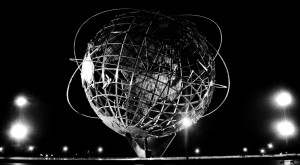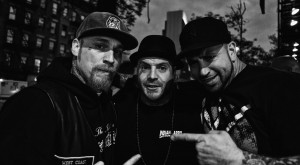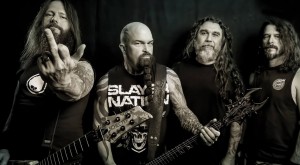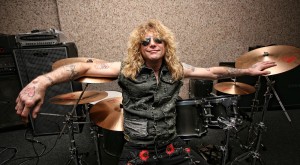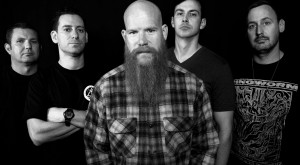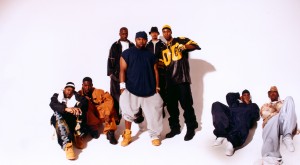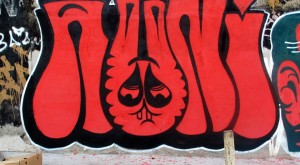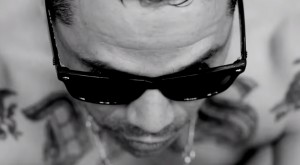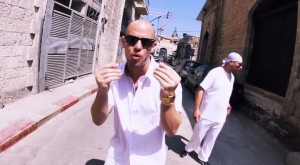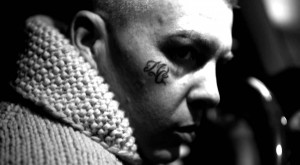Holland’s FaceCulture recently conducted an interview with bassist Adam Duce of San Francisco Bay Area metallers MACHINE HEAD. You can now watch the chat in five parts below. A few excerpts follow.
On going to reform school during his teenage years:
Adam: “I didn’t like it. I wasn’t having fun. You know what?! I had some fun, but for the most part, it was people telling you what to do. I don’t like people telling me what to do. I never have. I don’t like it now. [laughs] But sometimes that’s just what you’ve gotta deal with. I found out from the second reform school I was in that they will try and break you, they will try and make you think what they want you to. And you have an inherent truth inside of you — inside of everybody — that’s there. What the truth is for you is up to you — what you accept. I knew my truth and I knew that if I held on to it, I would get through all this shit and come out on the other side. And that’s what I did — I fucking just made sure that I didn’t fucking lose what what was right to me. And I came through it basically untouched — a little bit hardened by the way that you had to live in there, but…”
“After the first one, I went home for about four months. Then I went to the second one, and I came home for another four months. And in between 11 and 18, that was the whole time I lived with my parents. I went from one reform school to the next reform school to a mental hospital, for an O.D. [overdose], and then I went to juvenile hall from there, to a drug rehab, back to juvenile hall, and then to a group, where I turned 18.”
On whether he is still in contact with his parents:
Adam: “Oh, yeah. [pause] I don’t know what it’s like to grow up normal. To tell you the truth, I haven’t fucking met one ‘normal’ person in my entire fucking life. I think that word’s just kind of … there. What’s normal? So I only know the way that I grew up and it made me who I am. So can I be that mad about it? I’m not mad about it. I know some people who will hold on to shit like that like it’s money, but I don’t see why.”
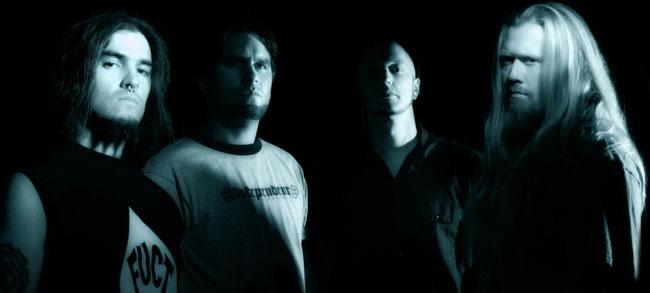
On what he did in the years prior to joining MACHINE HEAD:
Adam: “I was in a group home until I turned 18. I turned 18 in ’90. I lived in a small town called Ukiah, California. Well, actually, I lived out in the sticks in a place called Redwood Valley. And there was a total small-town mentality, where everybody knows everybody’s business — kind of likeFacebook is now. It’s fucking retarded. [laughs] That whole kind of a mentality and vibe in a town where everybody… ‘Oh, did you hear what so-and-so said?’ Everybody knows everbody’s first and last name, and nobody’s business is private. So I stayed at home a lot. [laughs] I stayed at home a lot with my bass, because I had more fun with that thing than I did with anybody else. So I just stayed there and played out my cassettes, just wearing them out, figuring out what these guys [the musicians on the tapes] were doing. That’s what I did for a few years.”
On how MACHINE HEAD was formed:
Adam: “I met Robb [Flynn, guitar/vocals] when I was about 16 through another friend of mine. And so we’d hang out a little bit. Well, we ended up living in the same apartment building. And so we were going out, partying and drinking and whatever, and we’d come back to the apartment, play acoustic guitar, yell songs and shit — just shit you do to kill time. . . He was in a band, VIO-LENCE. . . We ended up being roommates. And then we got into some trouble one night in Oakland — a big, big fight. It was me, Robb and one other dude against a crowd of black dudes. Three of them ended up getting stabbed. There was gonna be retaliation from the neighborhood. And the club that we were right down the street from banned us from the club, ’cause they didn’t want us getting killed in there. They knew that Robb was in VIO-LENCE, and so with that taking place, he thought, ‘Well, this is a fucking good time to break off from that, so they can’t find me and shoot me.’ [laughs] And so we started the band then, pretty much. That big fight was the catalyst.”
On why he thinks MACHINE HEAD has become as popular as it is:
Adam: “How come? Fuck – your guess is as good as mine. [laughs] How come? You know, we’ve got something that people wanna hear. The sound that we make apparently touches people the way that those bands that got me into this in the first place touched me. . . It’s different for everybody. What strikes a chord with you might not strike a chord with me. You hear a lot of the same things — it’s inspirational to people. I hear that we’ve helped people all the time. I hear that probably more than anything else — how much this song or that song helped this person or that person. . . [And] it gives me a bit of a sense that we’re doing something right.”
On MACHINE HEAD‘s debut album, 1994’s “Burn My Eyes”:
Adam: “I’m particularly proud of that one, just because it was a starving group of kids that kicked the door of the music business open, basically, and were not starving anymore. . . [We didn’t make] much [money], but I didn’t have to sit around hustling.”
“I look at [the songs on that album] as a period of time. What they meant to me back them is different than what they mean to me now. I mean, we’ve played ‘Old’ and ‘Davidian’ probably somewhere in the neighborhood of 1,100 times, and it’s just kind of taken a kind of karaoke feel — it’s not the same as it was when we wrote it. It’s really far removed at this point.”
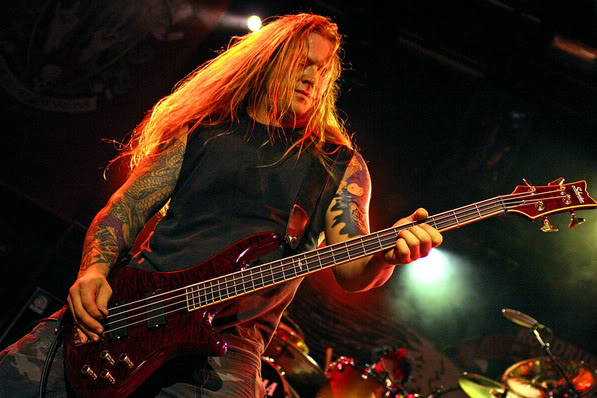
On MACHINE HEAD‘s second album, 1997’s “The More Things Change…”:
Adam: “That was the beginning of a lesson that we needed to learn. We didn’t know what to do. We had so much success on the first record, we weren’t really sure… I mean, we could write songs, but we didn’t know what exactly we were gonna be able to do as far as expanding on what we’d already done. And we kind of wrote songs in the same vein as the first record instead of just writing songs for the entertainment, ’cause that’s what we did in the first place.
“If you write new material and it’s a complete departure from where you were at, people will say, ‘Oh, I like that other thing better.’ If you do things that are too similar, [people will go], ‘Oh, that just sounds like more of the same.’ So you’ve really gotta march to your own drummer and just see where it takes you. I mean, a really good example of that is a band like METALLICA. They do whatever the fuck they want. And sometimes you like it and sometimes you don’t. But they don’t make any fucking apologies for it. ‘This is what we wanted to do.’ And a lot of it’s completely different, but it’s entertaining to them. And that’s the most important thing as a musician — you need to have something that works for you, that makes you feel that thing. ‘Cause if it doesn’t make you feel it, is anybody [else] gonna feel it?”
On MACHINE HEAD‘s third album, 1999’s “The Burning Red”:
Adam: “We started to analyze what we thought the music-buying public wanted, and so we decided to actively strip down songs and make them more simple. The thought behind it can be felt in the music. I mean, people still love that record, but I think that there was too much thinking and too much trying to figure out what was gonna sell. And so we did that, and everybody called us sellouts, this and that. And I don’t have a problem being called a sellout — I don’t give a shit. Call me whatever the fuck you want. I’ve gotta wake up and look at me in the mirror, not you. [laughs]
On MACHINE HEAD‘s 2001 album, “Supercharger”, and its follow-up, 2003’s “Through The Ashes Of Empires”:
Adam: “We were in huge debt with the record label, and they started making suggestions to what they wanted us to do. And when you owe somebody that much money, you tend to try and appease them, what they want and their ideas. So we did that. And we put the single, which was called ‘Crashing Around You’, and then just a few days later the World Trade Center came down, and… you do the math. They’re not gonna fucking sell that one. So that record got shelved right away. And then they [Roadrunner] started talking about dropping us. And so the reality of it was: ‘It looks like we could possibly not be able to do this anymore. Maybe we’re not gonna fucking play our instruments for a living anymore. Maybe this is the fucking end. We’ve got one last chance to make a record right here, right now. So what are we gonna do? If that’s the way it’s gonna be, let’s fucking go out the way we came in — flying our middle-finger flag as high as we can get it. Fuck you — that’s the last thing you’re gonna see from us.’ That was ‘Through The Ashes Of Empires’. And, of course, when we started to write music with that kind of attitude and that kind of reckless abandon, of course, it fucking reacted. That was the big lesson I was talking about. It took several years and several albums for us to learn that one, but the essence of great music is just going along for the ride with the songs.”
On MACHINE HEAD‘s approach to 2007’s “The Blackening”:
Adam: “When we did ‘Through The Ashes’ and we got Phil [Demmel, guitar] in the band, we could tell that it was gonna be the next record that really was special. The chemistry that we had with Phil was awesome. We only had him in there for the writing process for a couple of songs on ‘Through The Ashes’, so to have him in there for the entire process for ‘The Blackening’… We knew before we wrote one note for‘The Blackening’ that ‘The Blackening’ was gonna be ‘the one.’ Also, we were in a really good headspace. We had really good faith in what we were doing and the knowledge that you don’t need to control it, just let it flow and see what feels right. That was part of that big lesson that we had to learn — [to] do it for ourselves.”
On whether he felt any pressure following up “The Blackening”:
Adam: “I’m doing this for fun. If it doesn’t work out and I don’t get to make money doing this anymore, fuck it. If it’s not fun, then I don’t wanna do it. I don’t expect to get rich doing this. I wanna have a good time and I wanna make some good music.
“I had some issues with [the writing] process [for 2011’s ‘Unto The Locust’]. I kind of took myself out of it until it was time to write my bass lines. I wrote a bunch of music, or riffs, that Robb didn’t have any idea what to do with vocally, and so he didn’t wanna use any of that. But more importantly, I wrote lyrics that meant a lot to me and I gave it to him. I’ve given him page after page after page of lyrics. And it usually comes back that way, [where] he’ll use a verse or a part of it or whatever — ‘I’m gonna take this part and put it down here.’ . . . whatever works for the cadence. But I got kind of burned on putting my soul out on a piece of paper and giving it to him and when I see it next time, there’s no remnants of what the original idea was. And I was just like, ‘You know what, dude?! I’m not giving you any more fucking lyrics, because I’m fucking sick of looking at this, the way that it fucking turns out.’ I said, ‘I’ll work on it with you at the same time, but I’m not giving you any more lyrics. I’m not giving you pages of lyrics.’ He was fucking angry at me for a while, but you know… that’s fucking what happens.”
On whether he’s ever thought about quitting the band:
Adam: “I’ve thought about quitting on different occasions, but I mean,Robb‘s thought about quitting on different occasions as well. Dave[McClain, drums] actually quit the band. I can safely say everybody’s thought about quitting at one point or another.”
On whether his issues with the writing process were part of the reason he thought about quitting the band:
Adam: “No, I didn’t think about quitting over that — not because of that. I mean, that’s what happens in a fucking situation like this, but it’s a one-way street in my situation, ’cause [Robb] can work on his stuff as long as he wants to until he’s got it [right]. But it doesn’t work the same way, because I’m not the singer, so I don’t decide which cadence it goes into and what works for me. The final say is always his, because he’s gotta sing it.”
On whether he’s happy with the things he can contribute to MACHINE HEAD:
Adam: “Well, I find what’s important to me and where is my freedom. ‘Cause that is what is important to me — the freedom aspect of it. Because making music is freedom to me. Probably [in] several different ways, because I wasn’t allowed to have it while I was actually locked up. And just the freedom to go wherever you want to, the freedom to get yourself out of the way and let the music flow. [I still feel that freedom within MACHINE HEAD] with my bass lines — that’s where I found it. And so when it’s me and her [laughs], that’s what I do here. That’s my freedom.”
Part 1:
Part 2:
Part 3:
Part 4:
Part 5:
Every other week we send out our email newsletter with the latest music, clothing & lifestyle updates. Why don't you sign up, too, and never miss another article!

